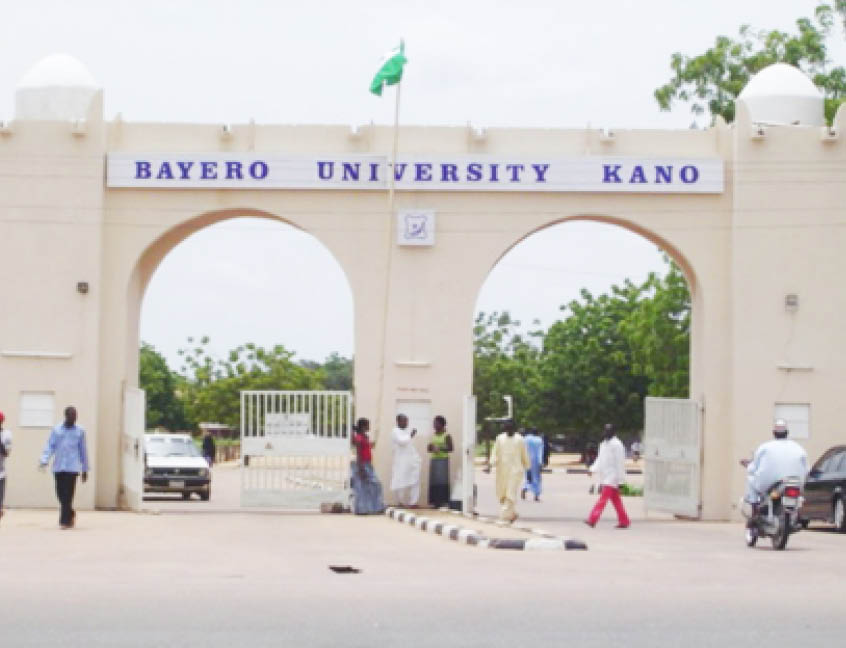In her third year, Rose Daniel (pseudonym), a 2014/2015 graduate of Mass Communication, Bayero University Kano, in Kano State, discovered that the record of her political science exam had been omitted from her end-of-semester student transcript. Each level coordinator usually presents a transcript to students at the end of each semester.
Rose approached her level coordinator, and after scanning through the score sheets, he confirmed that indeed, the B grade she scored in the exam had been omitted from her transcript. After nearly a year of follow-ups, Rose said the level coordinator informed her that the correction had been effected.
“When I asked for another end-of-semester transcript reflecting the change, he told me not to worry, that all that mattered was that the mistake had been corrected. I left with the hope that it had been done,” she said.
Based on her sessional transcripts, Rose had ended her first level on a 3.71 CGPA. At her second level, she dropped to a 3.66 CGPA; and by her third year, she maintained a CGPA of 3.66. And so, when her final year result was released, she noticed she had been short of a lower second-class honour by 0.05, making her CGPA 3.45.
- Naira Defies CBN’s Interventions, Regresses To 1,510/$
- Kano community where girls don’t go beyond secondary school

Even though she had doubted the lower second-class honours written on her school certificate, she could not prove that a mistake had been made without accessing her final transcript.
However, five years after graduating, Rose, who now lives overseas, applied for her transcript through a proxy. On getting it, she noticed that her CGPA had all along been 3.70, making her class of degree an upper second-class honour. She had been a 2:1 graduate, contrary to the lower second-class honours boldly written on the final certificate issued to her by the university five years before.
“On viewing the transcript, my heart dropped. I had suspected something like that, but I had no evidence to back my claim at that time,” she told this reporter.
Rose Daniel’s transcript indicates her class of degree as Upper Second-class Honours, contrary to what is on her certificate.
“I called the same level coordinator at the university and informed him of the problem, but his response was terrible. He told me to accept the certificate bearing the 2:2 like that. According to him, a certificate is more authentic than a transcript, and it was impossible to issue another certificate”, she said.
Not giving up, Rose said she wrote a letter of appeal to the Mass Communication Department, the office of the Deputy Vice Chancellor Academics and that of the Vice Chancellor requesting for another certificate that reflects her true class of degree.
As she hopes for a positive response from the university almost two years later, she told Daily Trust, in March, that the error in her class of degree had cost her a couple of job opportunities.
Universities and other tertiary institutions in Nigeria admit a significant number of students annually, with the Nigerian University System Statistical Digest of the National Universities Commission (NUC) revealing that 1.8 million undergraduate students and 242,000 postgraduate students were admitted to universities within the 2018–2019 academic year.
Though there is no publicly available statistical data of incidents like that of Rose Daniel, expert opinion indicates that mistakes, inconsistencies, and missing exam records are the result of poor exams and academic record-keeping in Nigerian universities.
Daily Trust on Sunday findings reveal that there is no publicly codified law specifically addressing the issue of record keeping in Nigerian tertiary institutions, except for the National Archives Decree (1992) and Freedom of Information Act (2011), which only highlights the need for efficient public record management.
The lack of a clear legal provision and penalties, despite the availability of numerous education laws, edicts, and acts, according to an archivist may have contributed to failure in promoting efficient record and archive management in Nigerian universities.
In this report, Daily Trust on Sunday sampled some of the country’s prestigious public universities to gather insights from ex-students and university insiders.
Findings reveal that administrative delays arising from deficient management of exams and academic records, and the lack of clear laws on public records to hold tertiary institutions accountable continue to leave a lasting bitter taste in the mouths of many students and ex-students.
Tales of woes from BUK
Jauro Ahmad (pseudonym), a graduate of the then Faculty of Computer Science and Information Technology, now Faculty of Computing at the Bayero University Kano, lost a Swedish scholarship in 2021 due to a delay by his alma mater in providing his transcript.
While speaking to Daily Trust in March, the 2019 graduate narrated how he later found that the issue of ‘incomplete grading’ from his 100-level continued to haunt him despite a hitch-free graduation.
According to BUK’s General Regulations Governing Postgraduate Studies, “an incomplete grading occurs when a candidate who has completed all aspects of the semester but, for reasons acceptable to the Senate, is unable to sit for the examination shall be graded as incomplete.”
This means the student will not carry over the course, but the continuous assessment will be carried forward when the exam is written the following semester, and the student will be fully graded.
“I found that the issue of incomplete grading from my first year had not been rectified, and it affected my overall grading. I was supposed to be graded as incomplete, but I was graded as a carryover student,” he said.
Ahmad, who said despite numerous follow-ups, his transcript was issued three months later, a delay which cost him the scholarship. He told this reporter that he reapplied for a corrected version of his transcript in 2022, but is yet to receive an update.
Saudat Abdullahi, another graduate of Mass Communication from the Bayero University Kano, said despite attending lectures and writing exams for a three-credit unit course in her 100 level, she found out that she had been graded absent on the result sheet.
Saudat’s result for the course in which she wrote the exams showed her being absent despite being present.
“I borrowed a three-unit course, Islamic Political Institutions, from the Political Science Department that became my nightmare until I got rid of it in my final year. I was surprised that I was graded as absent because I attended all the classes and sat for the exam, which I was confident I passed.
“I did a series of follow-ups so that my records would be updated, and I met the course facilitator, who showed me my booklet, and I scored ‘B.’ He then assured me that it would be corrected. But when the result came out the following semester, it was still graded as absent. I retook the exams in level four as a carryover,” Saudat added.
Daily Trust on Sunday reached out to the Head, Directorate of Public Affairs of Bayero University Kano, Lamara Garba, to comment on the allegations by some students, but he said he was busy and fixed a date to speak with this reporter.
Days later, several efforts were made to speak with Garba, but the university spokesperson failed to honour the promise. Weeks had passed at the time of filing this report and still, Garba failed to respond to a text message and Whatsapp on the allegations of poor exams and record-keeping raised by ex-students, so that he could clarify what steps the university was taking to rectify the challenges.
UNN, LASU ex-students lament delays in certificate, transcripts
Uche Daniel (pseudonym) was to graduate in 2021, but lockdown associated with the COVID-19 pandemic and Academic Staff Union of Universities (ASUU) strike pushed her graduation from the Faculty of Arts, University of Nigeria, to 2022. Like most fresh graduates of public universities, Uche is in possession of her statement of result, which has a one-year expiration date.
University of Nigeria Nsuka (UNN)
As the April 12, 2024 expiration date of her statement of result draws nearer, she began scouting and applying for scholarship opportunities to further her studies abroad. However, the lack of a transcript has left her with no option than to abandon them.
Through a proxy, Uche told Daily Trust on Sunday how she tried to apply for her transcript and certificate two years after graduation, but was told that the documents, despite being a prerequisite for scholarships and job openings, were not ready.
Uche Daniel’s statement of result expired on April 12, 2024, and she is yet to get her certificate two years after graduation.
“I was informed by a mentor within the school that both our certificates and transcripts were not ready when I wanted to apply for them. One of the reasons cited was that some students didn’t graduate with us at the time due to issues with their results, and they’ll need to work on all the results together.
“What I used for my NYSC is my statement of result, and it expires this month. Not getting my certificate and transcript is a problem for me because I have been applying for scholarships and job opportunities, but I have to abandon them due to a lack of both the transcript and certificate,” she added.
Uche, while speaking to Daily Trust on Sunday, noted that she had to abandon a lot of job and scholarship applications because she had no certificate or transcript.
Our correspondent reports that despite the availability of a certificate and transcript application page on the UNN portal, alumni like Uche, whose certificates and transcripts are not ready two years after graduation, continue to miss out on opportunities.
Meanwhile, Dada David (not real name) who had his PhD defence at the Lagos State University (LASU) in March 2023 said he was irritated after the delay in his PhD certificate cost him an offer in South Africa.

Lagos State University (LASU)
He told this reporter that he got a postdoctoral offer in South Africa at the cost of N12,000,000 annually for a period of three years. “When the school requested for my PhD certificate, I immediately contacted LASU and messaged my former lecturers within the university. They told me emphatically that the certificate printing office did not know that there was a programme called PhD Philosophy at LASU.”
He said the secretary of the postgraduate school had then written to the certificate printing office and with that intervention, he was told that the certificate printing machine at the time had been faulty for two months. He eventually got hold of his certificate in January 2024. “Sadly, I missed the opportunity in December 2023,” he said.
Daily Trust on Sunday reached out to the spokesperson of the UNN, Omeaku Okwun, via calls, a text message, and an email to his university mail but he failed to respond.
However, the Coordinator, Centre for Information and Public Relations of Lagos State University (LASU), Oluwayemisi Thomas, denied allegations of delayed certificates, describing issuance as a “stress-free process” when all due processes are followed.
“The allegation is totally false, uninformed and malicious. Certificate issuance in LASU is a stress-free process and no delay is experienced if the candidate follows the laid down procedures and presents the required documents for issuance of the certificate,” she said.
Ms. Thomas added that the university embarks on an intensive certificate release exercise immediately after convocation annually. “Certificates of graduates who have completed necessary online documentation are produced way ahead of the convocation ceremony,” she insisted.
UNIMAID ex-students bear the brunt of missing exam records
Muhsin Danladi (no real name), who graduated from the Faculty of Arts, University of Maiduguri (UNIMAID) in 1996, returned to the university almost two decades later to apply for his transcript, an important criterion for getting a postgraduate admission.
To his surprise, he found that getting the academic file that contained his records was like finding a needle in a haystack.
“When I visited where they kept the students’ records and files at the UNIMAID, it was not tidy. It was a huge, dark room filled with dusty files. When the need to find a certain file(s) arises, you have to give the staff ‘something’ to help you get those files. I pleaded and promised ‘something’ before they helped find my file”, he said.
Danladi explained that when his file was found and ready for computing to generate his transcript, he noticed the result of one of the courses he had rewritten during his undergraduate days was missing.
“They found that the result of a General Studies Test (GST), which I re-sat for, was missing in my file. That caused a bit of an issue because the course is a general study offered by all the students.
“I had to plead with one of the Exams and Record Office staff to follow me to the general studies unit to be able to search for my result. While there, I learned that there was a fire outbreak some years ago, and many of their files got burnt. It took several days of scrutiny, and luck to find my result, despite the inferno”, he said.
He said a letter was then written from the GST unit to the Exams and Record Department to enable them compute his results and subsequently send it to the school he applied to for his postgraduate studies.
Danladi said: “If not for luck, I wouldn’t have been able to further my studies. I would have been stagnant, or maybe started the degree all over. It is just like playing with your career and life entirely.”
Daily Trust reached out to another of Danladi’s coursemates, Binta David (not real name), who said she is yet to get her transcript after the school claimed that the result of a GST 201 exam she wrote and passed 27 years ago was lost in a fire incident.
“Twice, I had wanted to go for my Master’s (Degree), but I couldn’t without a transcript. In fact, I have lost interest due to the wicked acts of the Exams and Record Department of UNIMAID. Besides, it was not our fault that the GST department had a fire incident, but we are the ones suffering the consequences,” she added.
Also, 15 years after earning his first degree from UNIMAID, Abdulsalam Abubakar (not real name) requested his transcript from his alma mater while hoping to further his education.
Days of waiting turned to weeks of silence, and he sought assistance from some contacts within the institution.
Soon, his anticipation turned to disbelief when his contact informed him that his results and some of his academic records were nowhere to be found.
Abubakar said his meticulousness saved him from the near-miss event as he provided them with each of his end-of-semester transcript, which was used to compute his transcript.
However, when contacted, the spokesperson of the University of Maiduguri, Professor Danjuma Gambo, said even though the complaints about delays in the release of students’ transcripts are minimal, the university was taking a serious look at the process and delivery time.
He however said such complaints were not across the board. “Not every applicant has a problem with delay in the release of transcript. But the university, in response to some of the observations made, is undertaking a very significant reform as we are digitising our records to make them easily accessible to whoever needs to use them,” he said.
He, however, described as untrue the allegation that some graduates of the institution had to provide their records to the university for their transcripts to be generated.
“The university is the custodian of student records. No other authority in the world has records of our graduates better than the university that graduated them. So, to say that some graduates of the university had to provide their records before their transcripts were processed is completely wrong,” he said.
Deficient record-keeping affects institutional credibility – Archivist
A researcher and college librarian at the Federal College of Education in Odugbo, Benue State, Dr. Shehu Mabera, explained that deficient exams and academic record-keeping have dire consequences for both student outcomes and institutional credibility.
Dr. Mabera is an archivist with over three decades of experience in record-keeping and research.
He explained that for institutions, it may come with long-term consequences, as they may lose accreditation and global professional recognition.
“For students, the consequences include missing job or scholarship opportunities. Additionally, students, parents, and the wider community may lose trust in the university’s ability to provide a quality education and accurately evaluate student performance,” Mabera said.
He said Nigerian universities do not have a specific law on record keeping as obtainable in other developed societies. “International universities in developed societies have specific laws guiding record management within their institutions apart from their national laws and policies on record management. But in Nigeria, we don’t have such laws.
“The only thing is that the laws on archiving and the Freedom of Information Act can be applied to issues concerning records in public institutions, but regarding record-keeping in Nigerian universities, we don’t have such a law,” he added.
He maintained that poor exams and academic record-keeping in Nigerian universities have created negative implications that include delays in decision-making, timely graduation of students, and a decrease in the efficiency of the university as well as an increase in operating costs.
“In many universities in Nigeria, obtaining academic transcripts can be difficult and frustrating for students,” he said, and attributed such poor management practices to a lack of training and efficient policies.
The archivist described efficient record-keeping as a vital tool for maintaining academic integrity and reputation, saying it helps students and staff members practice academic integrity, prevents academic misconduct, safeguard academic reputation and ensures compliance and audits. “It also enhances research integrity, and builds trust and credibility within the academic community,” he said.
The librarian explained that by implementing effective records management practices, educational institutions can streamline the processing of student transcripts and certifications, ensuring that they are generated, stored, and accessed efficiently and securely using advanced technology.

 Join Daily Trust WhatsApp Community For Quick Access To News and Happenings Around You.
Join Daily Trust WhatsApp Community For Quick Access To News and Happenings Around You.


